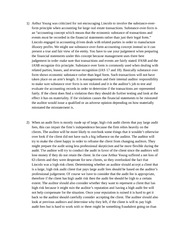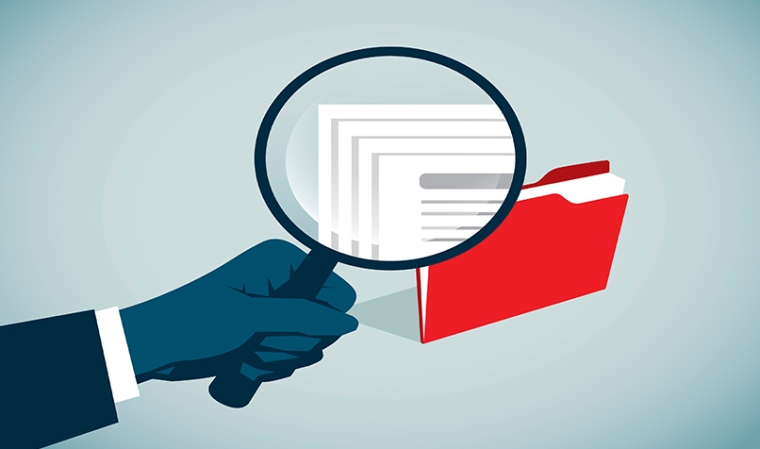The Lincoln Savings and Loan audit failure was a significant event in the history of financial regulation and corporate accountability. Lincoln Savings and Loan was a savings and loan institution that was established in the 1960s and had a history of financial instability. In the 1980s, Lincoln was acquired by Charles Keating, a businessman with a history of questionable business practices.
Under Keating's leadership, Lincoln engaged in a number of risky and fraudulent financial activities, including investing in high-risk, speculative real estate developments and selling questionable financial products to its customers. In addition, Keating used Lincoln's funds to enrich himself and his associates, while ignoring regulations designed to protect the savings of the institution's customers.
As a result of these actions, Lincoln Savings and Loan became heavily insolvent and was eventually seized by the government in 1989. The failure of Lincoln Savings and Loan was a significant event, as it was one of the largest and most costly failures of a financial institution in U.S. history, costing taxpayers billions of dollars.
The audit failure at Lincoln Savings and Loan was a result of a number of factors, including a lack of regulatory oversight, inadequate internal controls, and unethical business practices. In particular, the audit failure was due in part to the fact that Lincoln's auditors, Arthur Andersen, failed to adequately scrutinize the financial activities of the institution and did not report on the financial risks that were being taken by the company.
The audit failure at Lincoln Savings and Loan had significant consequences for both the company and its customers. Many of Lincoln's customers lost their life savings as a result of the institution's financial collapse, and the failure of the company had a negative impact on the overall economy. In addition, the audit failure at Lincoln Savings and Loan contributed to a loss of confidence in the financial industry and led to stricter regulations and oversight of financial institutions.
Overall, the Lincoln Savings and Loan audit failure serves as a cautionary tale about the importance of regulatory oversight and ethical business practices. It is a reminder that financial institutions have a responsibility to their customers and to the broader economy, and that those who fail to meet these responsibilities can suffer serious consequences.
Why Do Audits Fail? Evidence from Lincoln Savings and Loan by Merle Erickson, Brian W. Mayhew, William L. Felix :: SSRN

Beginning in 2001, the Journal of Accounting Research has been published by the ARC in partnership with Blackwell Publishing. JEL Classification: M49, K42 Suggested Citation:. Introduction This study describes and critiques the References: APCAR, L. To our knowledge, this is the first study to examine audit procedures documented in depositions and working papers from litigation over the adequacy of an auditor's performance. For this reason, the analyses in this study, although imperfect, provide an important basis upon which future research can build. In this paper, fraud means intentionally misstating the financial statements. With a growing open access offering, Wiley is committed to the widest possible dissemination of and access to the content we publish and supports all sustainable models of access.
Why do audits fail? Evidence from Lincoln Savings and Loan

Our online platform, Wiley Online Library wileyonlinelibrary. The Journal of Accounting Research publishes original research using analytical, empirical, experimental, and field study methods in accounting research. Twenty years of judgement research in accounting and auditing Michael Gibbins and Robert J. Finally, we summarize prior findings and offer conclusions and suggestions for areas where future research is needed. Nevertheless, the multivariate analysis also suggests that we can discriminate between the litigation and control firms using the variables that are significant in the univariate analysis. . Judgement and decision-making research in financial accounting: a review and analysis Laureen A Maines 5.
Lincoln Savings and Loan: Cause of Audit Failure

It is our view that had the auditors obtained this understanding and applied it to an evaluation of the substance of LSL's main source of profits during this period, sales of undeveloped Arizona land, the auditors would have reached different revenue recognition conclusions. JSTOR provides a digital archive of the print version of Journal of Accounting Research. How does rotation of the audit partner as required by SOX and the SEC interact with the need for industry knowledge and risk of performing an audit? Not what you're looking for? The role of knowledge and memory in audit judgement Robert Libby 8. You can help correct errors and omissions. We propose alternative procedures, based on information available to the auditors at the time of the audit, that might have prevented the audit failure. Other researchers have been unable to study audit procedures associated with audit failures, in spite of the compelling importance of such an inquiry, using traditional research methods.

These results stand in contrast to assertions by policy makers that incentives from stock-based compensation and the resulting equity holdings increase the likelihood of accounting fraud. Wiley has published the works of more than 450 Nobel laureates in all categories: Literature, Economics, Physiology or Medicine, Physics, Chemistry, and Peace. If you are a registered author of this item, you may also want to check the "citations" tab in your For technical questions regarding this item, or to correct its authors, title, abstract, bibliographic or download information, contact: Wiley Content Delivery email available below. In spite of objections from the audit firms' legal counsel, U. Our ability to draw such inferences is a unique characteristic of this type of research. Our core businesses produce scientific, technical, medical, and scholarly journals, reference works, books, database services, and advertising; professional books, subscription products, certification and training services and online applications; and education content and services including integrated online teaching and learning resources for undergraduate and graduate students and lifelong learners. District Judge Richard Bilby released to the public deposition transcripts and associated audit working papers from the civil litigation against the former auditors of LSL.






